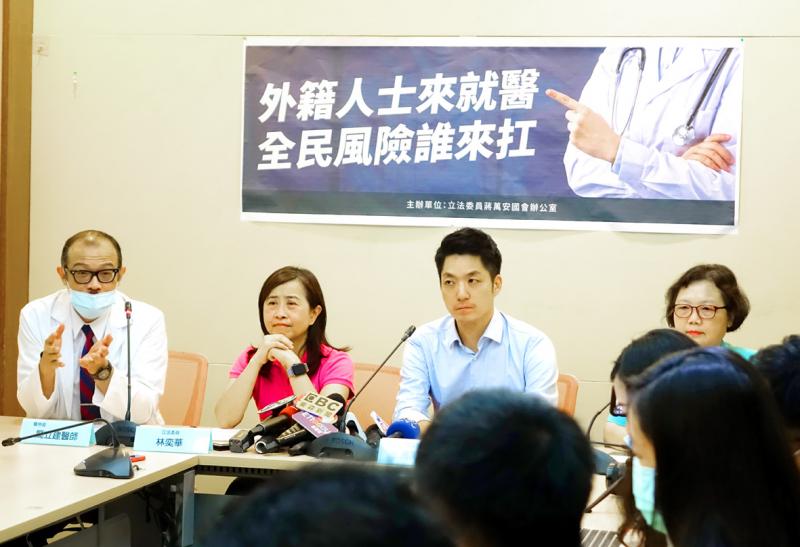Chinese Nationalist Party (KMT) Legislator Chiang Wan-an (蔣萬安) yesterday urged the central government to postpone and reconsider its policy on easing border restrictions for some medical tourists starting on Saturday.
Citing the stability of the local COVID-19 situation, the Central Epidemic Command Center on Wednesday last week announced that starting on Saturday, foreign medical patients could apply for treatment in Taiwan, except for those with non-urgent medical needs, such as physical examinations and aesthetic medicine.
On March 19, border controls were tightened due to the coronavirus, restricting the entry of non-Taiwanese and interrupting treatments for some foreigners, as they were no longer able to travel to Taiwan, the center said.

Photo: Wang Yi-sung, Taipei Times
Many healthcare workers, as well as other members of the public, are “very concerned” about the policy, Chiang told a news conference in Taipei yesterday, adding that the announcement resulted in a backlash from medical personnel.
Many people have doubts about the government introducing the policy when the COVID-19 situation abroad is still serious, he said.
Chiang asked whether the safety of Taiwanese and the nation’s frontline medical staff should be risked for the healthcare rights of foreign patients.
He questioned whether there had been sufficient communication with healthcare workers to reach a consensus, and whether adequate measures were being taken to support the policy.
The central government should more clearly explain the policy, he said, adding that it should reveal estimates of how many foreign patients would be entering under the policy, from which nations and for what treatments.
Chiang called on the Ministry of Health and Welfare to postpone the policy’s implementation until there has been more communication and preparation.
KMT Legislator Lin Yi-hua (林奕華) asked whether there were diplomatic or economic factors behind the ministry’s decision to allow foreign medical patients entry at this time.
The ministry should listen to the voices of the nation’s frontline medical workers, she said, urging the ministry to reconsider the policy.
Taiwan Medical Alliance for Labor Justice and Patient Safety representative Chien Li-chien (簡立建) said that before announcing such policies, the government should communicate with the nation’s frontline medical workers.
Taiwan Union of Nurses Association standing director Lin Hsiu-chu (林?珠) said there would be gray areas involved in granting foreign patients entry, as definitions might vary for aesthetic procedures and physical examinations.
Nationality is not important when helping patients, but it is crucial to protect the nation’s medical personnel and healthcare resources, she said.

A magnitude 4.9 earthquake struck off Tainan at 11:47am today, the Central Weather Administration (CWA) said. The hypocenter was 32.3km northeast of Tainan City Hall at a depth of 7.3km, CWA data showed. The intensity of the quake, which gauges the actual effect of a seismic event, measured 4 in Tainan and Chiayi County on Taiwan's seven-tier intensity scale, the data showed. The quake had an intensity of 3 in Chiayi City and County, and Yunlin County, while it was measured as 2 in Kaohsiung, Nantou County, Changhua County, Taitung County and offshore Penghu County, the data showed. There were no immediate reports of

Weather conditions across Taiwan are expected to remain stable today, but cloudy to rainy skies are expected from tomorrow onward due to increasing moisture in the atmosphere, according to the Central Weather Administration (CWA). Daytime highs today are expected to hit 25-27°C in western Taiwan and 22-24°C in the eastern counties of Yilan, Hualien, and Taitung, data on the CWA website indicated. After sunset, temperatures could drop to 16-17°C in most parts of Taiwan. For tomorrow, precipitation is likely in northern Taiwan as a cloud system moves in from China. Daytime temperatures are expected to hover around 25°C, the CWA said. Starting Monday, areas

A Taiwanese software developer has created a generative artificial intelligence (AI) model to help people use AI without exposing sensitive data, project head Huang Chung-hsiao (黃崇校) said yesterday. Huang, a 55-year-old coder leading a US-based team, said that concerns over data privacy and security in popular generative AIs such as ChatGPT and DeepSeek motivated him to develop a personal AI assistant named “Mei.” One of the biggest security flaws with cloud-based algorithms is that users are required to hand over personal information to access the service, giving developers the opportunity to mine user data, he said. For this reason, many government agencies and

Taiwan has recorded its first fatal case of Coxsackie B5 enterovirus in 10 years after a one-year-old boy from southern Taiwan died from complications early last month, the Centers for Disease Control (CDC) said yesterday. CDC spokesman Lo Yi-chun (羅一鈞) told a news conference that the child initially developed a fever and respiratory symptoms before experiencing seizures and loss of consciousness. The boy was diagnosed with acute encephalitis and admitted to intensive care, but his condition deteriorated rapidly, and he passed away on the sixth day of illness, Lo said. This also marks Taiwan’s third enterovirus-related death this year and the first severe